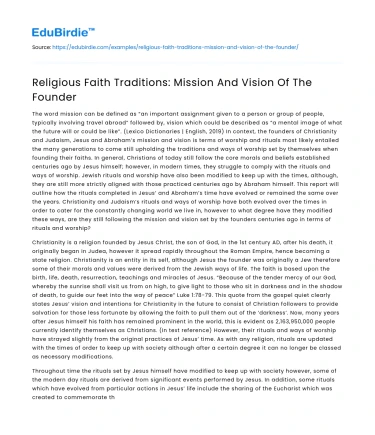Introduction
The founding figures of major religious traditions have significantly impacted human civilization, offering frameworks of meaning, ethics, and community. Central to these traditions are the missions and visions articulated by their founders, which often reflect profound spiritual insights and societal ideals. These founding visions have historically shaped not only the religious landscapes but also the cultural and social fabrics of societies worldwide. This essay examines the missions and visions of notable religious founders, such as Jesus Christ, Prophet Muhammad, and Siddhartha Gautama, and their enduring influence on their respective religious communities. By analyzing these foundational figures, we gain insights into how their teachings continue to guide and inspire billions of adherents. Furthermore, understanding these missions within historical contexts allows us to appreciate the adaptive nature of religious traditions in addressing contemporary challenges.
Mission and Vision of Jesus Christ
Jesus Christ, the central figure of Christianity, articulated a mission rooted in love, redemption, and the establishment of God's kingdom on Earth. The vision of Jesus, as recorded in the New Testament, emphasizes the transformative power of divine love and redemption. "For God so loved the world," asserts John 3:16, "that he gave his one and only Son, that whoever believes in him shall not perish but have eternal life." This passage encapsulates the core of Jesus' mission: the salvation of humanity through faith and grace.
Save your time!
We can take care of your essay
- Proper editing and formatting
- Free revision, title page, and bibliography
- Flexible prices and money-back guarantee
Jesus' teachings, such as the Sermon on the Mount, further delineate his vision of a just and compassionate society. His call for love towards one's neighbors and enemies alike challenges conventional social norms, advocating for a radical reimagining of community and interpersonal relations (Matthew 5-7). This revolutionary vision has inspired movements for social justice and equality throughout history, from early Christian communities to modern liberation theology.
Critics, however, argue that the universality of Jesus' message can sometimes be overshadowed by institutional dogma and historical misinterpretations. Nonetheless, the essence of his mission—a call to transformative love and communal responsibility—remains a powerful motivator for individual and societal change. By examining Jesus' mission and vision, we gain insight into the spiritual underpinnings that continue to inspire and guide Christian communities around the world.
Prophet Muhammad's Mission and Vision
Prophet Muhammad, the founder of Islam, articulated a mission centered on monotheism, justice, and moral rectitude. The vision of Muhammad is encapsulated in the Quran, Islam's holy text, which Muslims believe to be the literal word of God as revealed to Muhammad. His mission was to restore the worship of the one true God, Allah, and to establish a moral and ethical framework for human conduct. The Quran repeatedly emphasizes justice, community welfare, and the importance of compassion, as seen in verses like Quran 16:90: "Indeed, Allah commands justice, the doing of good, and liberality to kith and kin."
Muhammad's vision extended beyond spiritual reformation to encompass societal transformation. His establishment of the first Islamic state in Medina reflected a commitment to social justice, economic equity, and political unity. This vision of a just and cohesive society remains a cornerstone of Islamic teaching and continues to inspire Muslim communities globally to strive for social and economic justice.
While some critics highlight instances of historical conflict associated with the spread of Islam, it is essential to contextualize these events within the broader mission of peace and justice that Muhammad advocated. The Prophet's vision of an ethical and equitable society challenges adherents to address contemporary issues, such as poverty and inequality, in ways that reflect the core values of Islam. Thus, Muhammad's teachings continue to serve as a guiding light for Muslims seeking to navigate the complexities of modern life.
Siddhartha Gautama's Mission and Vision
Siddhartha Gautama, known as the Buddha, founded Buddhism with a mission to alleviate suffering through enlightenment and self-awareness. His vision, articulated in the Four Noble Truths and the Eightfold Path, provides a comprehensive framework for understanding and overcoming the root causes of human suffering. "The mind is everything," the Buddha is quoted as saying. "What you think, you become." This insight underscores the transformative potential of mindfulness and self-awareness.
The Buddha's vision of a world free from suffering and attachment continues to resonate with millions of adherents. His teachings promote a path of personal and communal harmony, emphasizing ethical conduct, mental discipline, and wisdom. The Buddhist principles of compassion and non-attachment have influenced diverse cultural and philosophical traditions, fostering a global discourse on spirituality and ethics.
Despite critiques that Buddhism's emphasis on personal enlightenment can sometimes overshadow social engagement, the tradition has evolved to address societal issues through movements like Engaged Buddhism. This adaptation reflects the enduring relevance of the Buddha's mission and vision in promoting peace and well-being in a rapidly changing world. Through the lens of Siddhartha Gautama's teachings, we explore a path of inner transformation that continues to inspire individuals and communities worldwide.
Conclusion
The missions and visions of religious founders like Jesus Christ, Prophet Muhammad, and Siddhartha Gautama have left indelible marks on human history. Their teachings provide foundational principles that continue to shape religious and ethical discourse in contemporary society. While each founder articulated a unique vision, common themes of love, justice, and enlightenment emerge, highlighting the universal quest for meaning and fulfillment. These religious traditions, while rooted in distinct historical contexts, offer enduring insights into the human condition and the pursuit of a just and compassionate world.
In acknowledging the critiques and historical complexities associated with these religious traditions, we appreciate the dynamic interplay between foundational teachings and contemporary challenges. By engaging with the missions and visions of these founders, we not only gain a deeper understanding of their spiritual legacies but also find inspiration to address the pressing issues of our time. Ultimately, the enduring impact of these religious figures underscores the transformative power of faith in guiding personal and societal change.






 Stuck on your essay?
Stuck on your essay?

